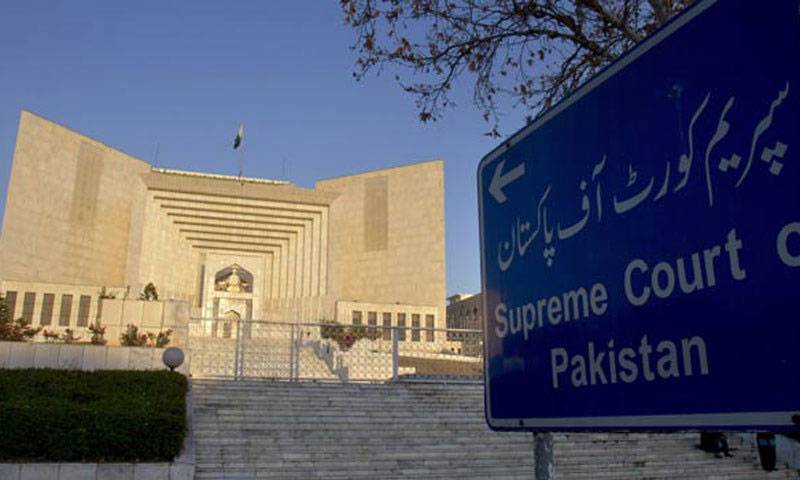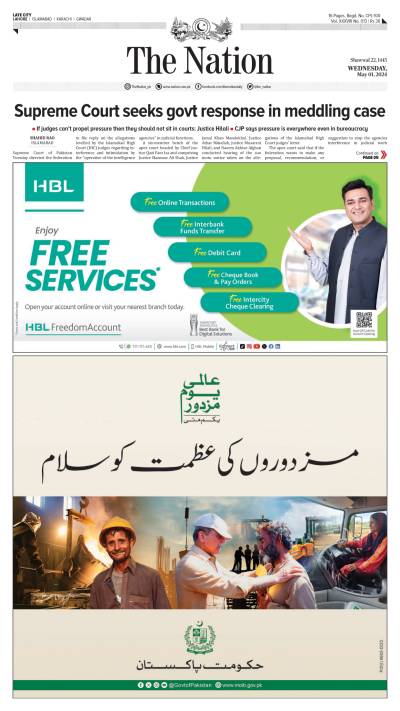ISLAMABAD - Justice Jawwad has said the Supreme Court in the 18th Amendment case had accepted the supremacy of the parliament, therefore it had referred the matter to the National Assembly.
Full court of the SC, headed by Chief Justice Nasir-ul-Mulk, was hearing the petitions against the 18th Amendment. The chief justice said that in the 18th Amendment case the matter was referred to the Parliament so that it itself reconsider the matter.
During the proceedings, the chief justice inquired from Hamid Khan, counsel for various bar councils, including SHCBA, suppose if there is a popular demand, but no revolution, to change Pakistan to secular state then what mode would be adopted?
Hamid Khan replied that it could be done through the Constituent Assembly. Upon that the chief justice asked under what provision of law, Constituent Assembly be constituted?
Justice Saqib Nisar said let's assume a political party includes in its manifesto that Pakistan should be a secular state, and wins elections with a vast majority, then would that parliament be entitled to bring changes in the Constitution in that respect? Justice Azmat Saeed Sheikh stated: "Though constitutional amendment could not be challenged but we have to see that in the garb of amendment, the constitution is not destroyed."
Justice Jawwad S Khawaja said Article 2A of the Constitution states Islam would be the state religion of Pakistan. He questioned whether the parliament could undo this and declare that Pakistan would be secular one?
The judge said when Pakistan was created in 1947 it was decided that Islam would be state religion. "Later, East Pakistan separated from us and became an independent state - Bangladesh." He said Bengalis chose secular system and when General Irshad declared Islam should be state religion of Bangladesh it was challenged in the Supreme Court of Bangladesh, which had rejected it. Justice Jawwad questioned whether Pakistan parliament could do this?
Justice Saqib inquired how the Constituent Assembly would be established? Will it come through revolution or by abolishing the present assembly? Justice Jawwad remarked in Bangladesh and Turkey there was no revolution.
The court inquired from the counsel, how the constitutional amendment could be struck down? Justice Jawwad stated: "If we read the constitution carefully then we find there is textual support. Hamid Khan said there is conceptual support and not the textual. He argued that the Committee that passed the Objectives Resolution all its Muslim members approved it, while the non-Muslim members had opposed it.
Hamid Khan argued that in the Mehmood Khan Achakzai case the basic structure has precisely been dealt with. He said the amendment was challenged on the ground of basic structure. The chief justice questioned what finally was held in that judgment. Hamid Khan replied it was dismissed, adding the court had observed that the controversy in that case was of political nature.
Justice Ejaz Afzal remarked that the clause of 5 and 6 of Article 239 of Constitution are contradictory.
Hamid Khan replied that these two clauses of Article 239 have to be seen with a pinch of salt. He said that 65 articles of 1973 Constitution were amended or changed through Revival of Constitutional Order (RCO) and Provisional Constitutional Order (PCO). "This is our history," he said, and added everyone knows that under which circumstances the 8th Amendment was passed. The parliamentarians put the condition that 8th Amendment would not be passed until Martial Law is lifted.
The chief justice remarked that the 8th Amendment was never challenged or amended by the subsequent parliaments. No parliament changed the clauses 5 and 6 of Article 239. Hamid Khan responded that it is true that the parliament retained these clauses, but kept the question open whether any constitutional amendment be passed without disturbing the basic structure?
The counsel contended that the Supreme Court in its short order in the 18th Amendment case stated what could be the basic structure of constitution? Justice Saqib said the short order is always tentative and sometimes merged into the final judgment. Hamid Khan argued that the interim order is based on certain reasons.
Hamid Khan argued that parliament could make rules unless the basic structure is not disturbed. Justice Saqib said it should be determined for all times to come whether constitutional amendment could be struck down on the basis of basic structure. Justice Asif Saeed Khan Khosa remarked they (judges) have taken oath of Constitution and there is nothing in it that the constitutional amendment could be struck down.
During the proceedings, Hamid Khan again argued that Parliamentary Committee's role for judges appointment should be excluded as it undermines the independence of judiciary and violates the principle of separation of power.
However, the court observed its oversight role has been determined in the Munir Bhatti case. The chief justice stated that parliamentary committee proceedings are not discussed in the Parliament like the proceedings of other committees. "This committee is constituted under Constitution and not the Parliament Rules."
Hamid Khan contended that the Parliamentary Committee is the politicised committee, as four of its members are nominated by Leader of House and four by the Leader of Opposition. Justice Ejaz questioned whether there was empirically verified data to show that the parliamentary committee has politicised the judges' appointment. Hamid Khan quoting the press clipping said the parliamentarians wanted to introduce 22nd Amendment to give more power to parliamentary committee.
Hamid was still arguing, but the chief justice adjourned the hearing till Tuesday.
Thursday, May 02, 2024
Constitution can’t be destroyed in the garb of amendments: SC

IHC seeks 'proof' ex-PM retained cipher
5:05 PM | May 01, 2024
Deputy PM Ishaq Dar arrives in Gambia to represent Pakistan at OIC Summit
5:04 PM | May 01, 2024
Google marks World Labour Day with special doodle
5:03 PM | May 01, 2024
Punjab police need reforms, donning uniforms doesn't solve problems: Gandapur
5:02 PM | May 01, 2024
Maryam launches field hospitals project to bring healthcare to people's doorsteps
5:01 PM | May 01, 2024
Cross Border Killings
May 01, 2024
Procurement Protests
May 01, 2024
Partner in Arms
May 01, 2024
Media Under Siege
April 30, 2024
Regional Resurgence
April 30, 2024
Labour liberation
May 01, 2024
DNA discoveries
May 01, 2024
Cloud health revolution
April 30, 2024
Revolutionising rural learning
April 29, 2024
Information failure
April 29, 2024
ePaper - Nawaiwaqt
Advertisement
Nawaiwaqt Group | Copyright © 2024





